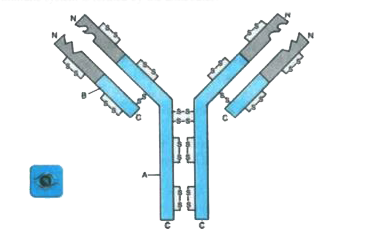What is antibody?
Step-by-Step Solution:
1. Definition of Antibody: An antibody is a type of protein produced by the immune system in response to foreign substances known as antigens.
2. Structure of Antibody: Antibodies have a distinctive Y-shaped structure. This shape is crucial for their function in the immune response.
3. Role of Antigens: Antigens are foreign bodies that enter the body. They can include various substances such as pollen grains, bacteria, viruses, or any foreign proteins that are not part of the body.
4. Immune Response: When antigens are detected, the body initiates an immune response, which involves the production of antibodies specifically designed to target those antigens.
5. Function of Antibodies: Antibodies bind to the antigens at specific sites. This binding leads to an antigen-antibody reaction, which helps neutralize or eliminate the foreign invaders from the body.
6. Conclusion: In summary, antibodies are crucial components of the immune system that help protect the body from infections by targeting and neutralizing foreign antigens.
---
Topper's Solved these Questions
- MICROORGANISMS - FRIEND AND FOEBook:PEARSON IIT JEE FOUNDATIONChapter:MICROORGANISMS - FRIEND AND FOEExercise:TRACK YOUR LEARNING-I
Explore 6 Videos
- MICROORGANISMS - FRIEND AND FOEBook:PEARSON IIT JEE FOUNDATIONChapter:MICROORGANISMS - FRIEND AND FOEExercise:TRACK YOUR LEARNING-II
Explore 5 Videos
- CROP PRODUCTION AND MANAGEMENT Book:PEARSON IIT JEE FOUNDATIONChapter:CROP PRODUCTION AND MANAGEMENT Exercise:COMPETITIONS CORNER
Explore 44 Videos
- POLLUTION OF AIR AND WATERBook:PEARSON IIT JEE FOUNDATIONChapter:POLLUTION OF AIR AND WATERExercise:COMPETITION CORNER
Explore 56 Videos
Similar Questions
Protective proteinous chemical compounds produed by the immune cells in response to antigens are called antibodies, also called immunoglobulins. There are five classes of antibodies: IgA, IgD, IgE, IgG and IgM. Following diagram is that of a specific class of antibodies. Observe the diagram and answer the questions listed below the diagram:
(i) To which class of antibodies, this antibody belongs to ?
(ii) Identify the parts of the diagram labelled as A and B.
(iii) Give the name of the part of antibody which binds the antigen.
(iv) Which type of immune system is formed by the antibodies?

View SolutionColostrum of human female contains antibodies-A/antibodies-G
View Solution
Knowledge Check
Which antibody is called secretery antibodies
AIgEBIgACIgGDIgMWhich cell secretes antibody?
ALymphocytesBMonocytesCEosinophilsDNeutrophilsAntigens binds to this part of antibody.
AParatopeBepitopesCFC fragmentDFab fragment
Shape of antibody is like
View SolutionAntibody is
View SolutionAntibody is
View SolutionWhich one secretes antibody
View SolutionThe antigen-antibody immunological reaction is used to be regarded as typical of immunological responses. Antibodies are proteins synthesized by specialized cells called plasma cells, which are formed by lymphocytes (cells from the lymph system) when an antigen, a substance foreign to an organism's body, comes in contact with lymphocytes. Two important manifestations of antigen-antibody immunity are lysis, the rapid physical rupture of antigenic cells and the liberation of their contents into the surrounding medium. and phagocytosis, a process in which antigenic particles are engulfed by and very often digested by macrophages and polymorphs. The process of lysis is executed by a complex and unstable blood constituent known as complement, which will not work unless it is activated by a specific antibody: the process of phagocytosis is greatly facilitated when the particles to be engulfed are coated by a specific antibody directed against them.
What are antibodies ?
View Solution
